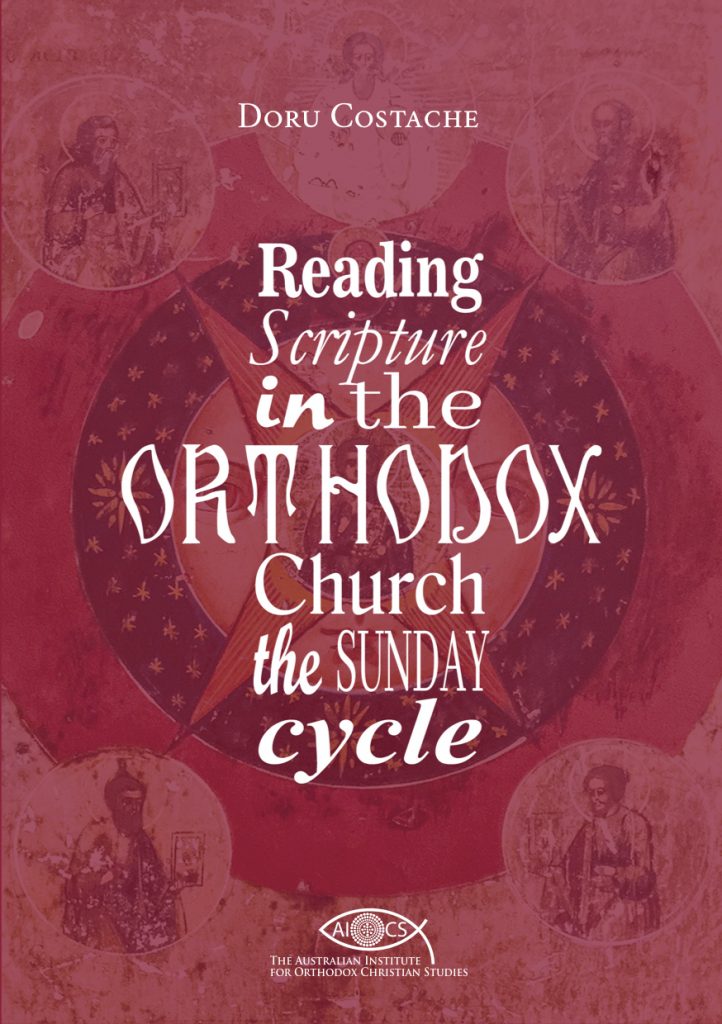Reflections on the Paschal season
Protopresbyter Dr Doru Costache
Part Four: The Fourth Sunday
Recorded on 13 May 2020
Free content
Topic: Discriminations of all kinds and the need for personal and social healing
Reflective framework
The Paschal Revolution: Beyond the Forty Days with the Risen Lord
Reflection on the festival’s scriptural readings: Acts 9:32–34. John 5:1–15.
Excerpt from Reading Scripture in the Orthodox Church: The Sunday Cycle (pp. 24-25)
As the Lord does, so does his servant. Christ healed a paralytic. In Christ’s name and as a proof of the Gospel, Peter healed another paralytic and brought back to life a dead woman. The Gospel of the Lord is endowed with life-giving power. The Gospel is power. The Gospel is healing. The Gospel is life. However, in following the paschal narrative, we should ask what life we are called to contemplate here. The paschal revolution is about newness of life (Romans 6:4) and abundance of life (John 10:10), not physical healing and futile miracles (Matthew 7:21–23). It is about rebirth and renewal (John 3:3,5). It is about people becoming temples of God (1 Corinthians 3:16; 6:19). It is about salvation, change, progress, and perfection. The Lord healed a man in order to give him an opportunity to change his life, to sin no more. In like manner, Peter acted so that people might see the power of Jesus and accept the Gospel. In all these cases, healing, whether for the benefit of one or many, point to something beyond the restoration of bodily health and life. Within the paschal context, this higher aspect amounts to the call for believers to go from the paralysis of sin to renewal and fullness of life. Conversion is not a single event, which happens once and for all. It is a series of events corresponding to the bodily birth, which represents the beginning of a lifelong process of becoming. Conversion is an ongoing occurrence. Furthermore, conversion corresponds to the constant care needed after a lengthy convalescence. Conversion is ceaseless if one wishes to be free of sickness. We are paralysed by our sins; sometimes the inner sickness translates into bodily manifestation, sometimes not. We are, nonetheless, wounded by our sins. Our healing and change do not happen suddenly, once and for all. Conversion means healing our heart, our mind, our life. Such a profound healing takes time, a lifetime, and we must continuously desire it—much like the paralysed man from Bethesda. We do not know how his story unfolded beyond his encounter with the Lord. What we do know is that complete healing happens when we seek to change and undertake that change, like the leprous man who, once bodily healed, returned to the Lord with gratitude (Luke 17:12–19). Everything else is secondary, including sabbaths and miracles. The new creation is what matters (Galatians 6:15).
Reflection on the festival’s message
Excerpt from The Orthodox Spring: A Diary (pp. 63–65)
Christ is risen! Moving towards the end of the paschal season, one realises more and more the derelict state of contemporary Christianity, including its Orthodox iteration. Materialism, xenophobia, racism, and misogyny are on the rise, especially in traditionalist, or conservative, quarters. Materialism? Yes, wealth is a sign of divine election, and you can’t be a member because you’re neither rich nor influential. Xenophobia and racism? Yes, it’s good to be white, and since we’re here why should anyone else be? Stay with your people, go back to your country; the fact that your faith convictions coincide with our own doesn’t concern us. Misogyny? Yes, women should shut up, put the headscarf on, and obey their male superiors. And so on, and so forth. These conservative “values” are explicitly at odds with the three Sundays leading to Ascension. Let’s take the Fourth Paschal Sunday (Acts 9:32–42; John 5:1–15). People receive healing and one believer is brought back to life. All good; praise the Lord! But is there any change of life they undergo after being freed from illness and death? They surely must feel something, see differently, do things otherwise, so that the miracles are not wasted on them. Granted, we cannot answer these questions, since Scripture does not tell the story of the aftermaths. But these questions are nevertheless important, concerning us too. We are in the same position, for Christ, risen from the dead, grants us life, those in the tombs. And, as resurrected people, we must walk in the newness of life. But how? The Fifth Paschal Sunday (Acts 11:19–30; John 4:5–42) gives three answers. First, the principle of true life is located within, not without. The true life is to experience the divine presence in my heart, which becomes a spring of water gushing up to eternal life—not a matter of gathering dust. Material goods are neither who I am nor the principle of life; they are what I might have or not have, but they cannot define who I am. Being either rich or poor is not who I am. I must nurture who I truly am so that I do not hear the terrible voice in the night, telling me that this is it, and that my acquisitiveness led to nought (Luke 12:20–21). The measure of who and what I am is given by the sweet warmth of the Spirit’s breath in my heart. Therefore, to walk in the newness of life is to cultivate God’s grace poured into my heart. Second, to walk in the newness of life is to live a Christlike life, loving all people equally. No more Samaritans and Jews. No more Jews and Gentiles. God’s love makes all people equal, sisters and brothers, beloved children of one Father (Matthew 5:44–45). Altruism, compassion, and hospitality towards all must be our norm, not random exceptions from racism and xenophobia. The latter are against the newness of life. Third, while the disciples were puzzled and lacked understanding, the Samaritan woman became an apostle and preached to a whole city. Imagine what would have happened had she “conservatively” cowered, shutting up, hiding behind the headscarf, and obediently going by the “tradition” that banned women from speaking in public. To walk in the newness of life is to recognise that gender stereotypes and customs do not define one’s humanity. Not in Christ. Cowardice and courage do not pertain to gender; they pertain to personal character. Women should not shut up in church and wear the headscarf of obedience as a sign of their gender. When will you, proud man, wear your own headscarf of obedience? Aren’t we all, men and women, Christ’s brides? And when will you, proud man, keep quiet humbly, instead of presuming silly things about Christ’s Gospel? Aren’t we all supposed to listen to the Lord? To walk in the newness of life as bearers of the paschal message means to open the eyes of understanding. This is the message of the Sixth Paschal Sunday (Acts 16:16–34; John 9:1–38): to see things differently and to do things differently, not as Babel’s children. It means to see things in the light of the risen Lord, to live and to act accordingly. This is Christ’s paschal work, and the Gospel makes no other promise. Let no mouth open to gainsay it. Glory be to him!
16 May 2020 © AIOCS
Please support our not-for-profit ministry (ABN 76649025141)
For donations, please go to https://www.paypal.com/paypalme/aiocsnet or contact us at info@aiocs.net


